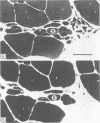Abstract
In patients with prior polio there was an excessive use of remaining motor units and an absence of type II muscle fibres in the tibialis anterior (TA). In the present study, eight subjects with prior polio with more than 90% type I fibres in the TA were examined. The aim was to elucidate whether the lack of type II muscle fibres was due to a selective loss of motoneurons with high threshold and high axonal conduction velocity or due to a muscle fibre transition from type II to type I. There was no decrease of the proportion of motoneurons with high threshold and high axonal conduction velocity. Monoclonal antibodies against fast and slow myosin heavy chains (MHC) were used as histochemical markers and many muscle fibres of type I according to ATPase stainability showed a binding of both anti-fast and anti-slow MHC. It is suggested that the type I muscle fibre dominance in prior polio subjects with excessive use of TA during walking is due to a muscle fibre transition from type II to type I and not to a loss of one class of motor units.
Full text
PDF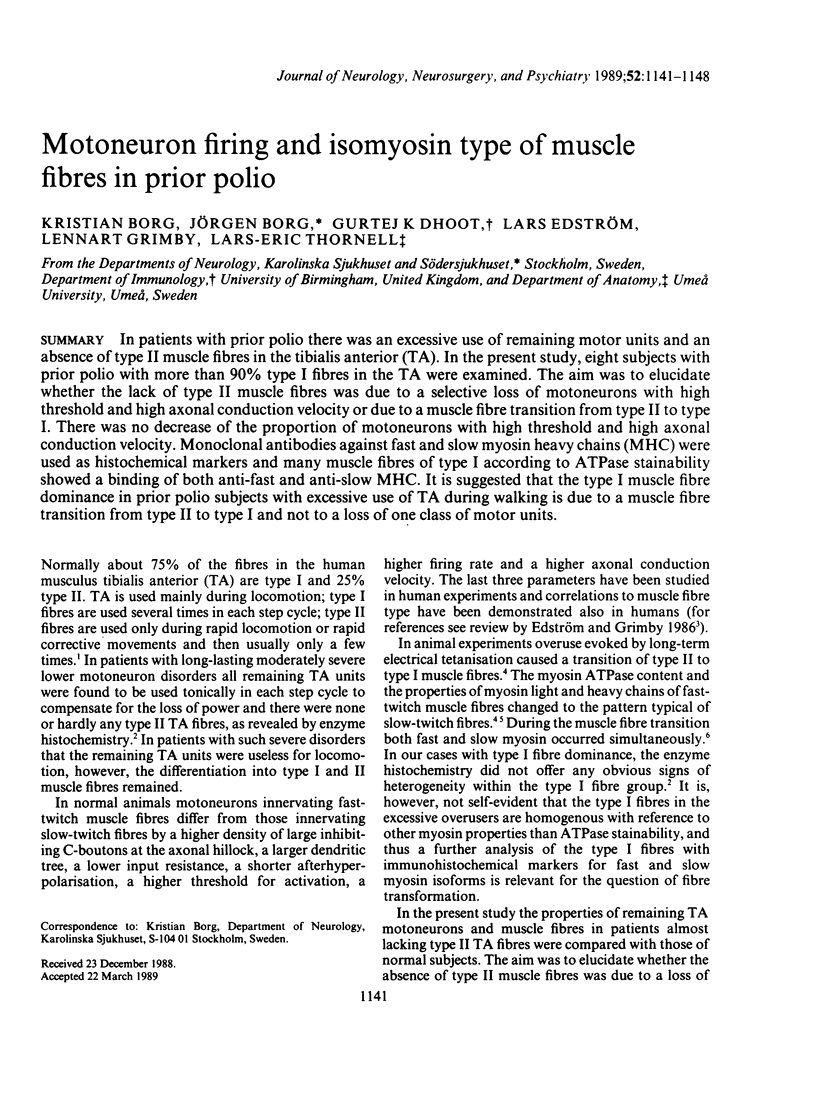
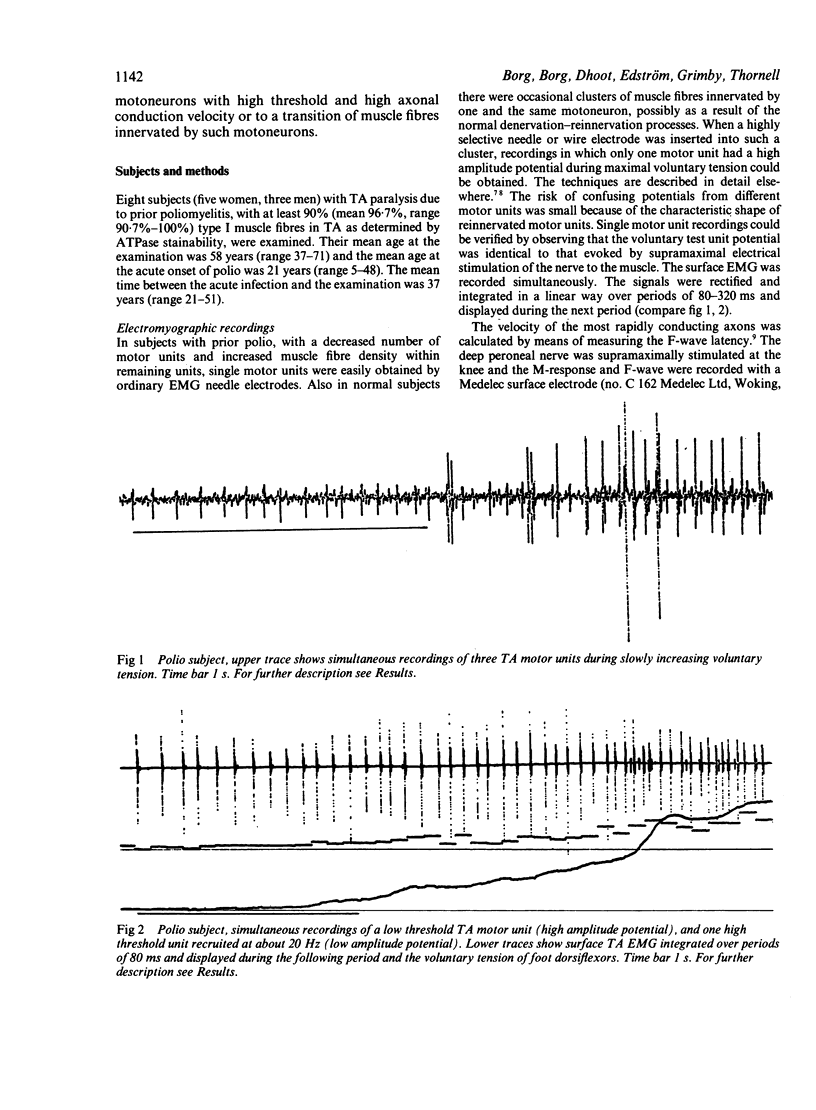
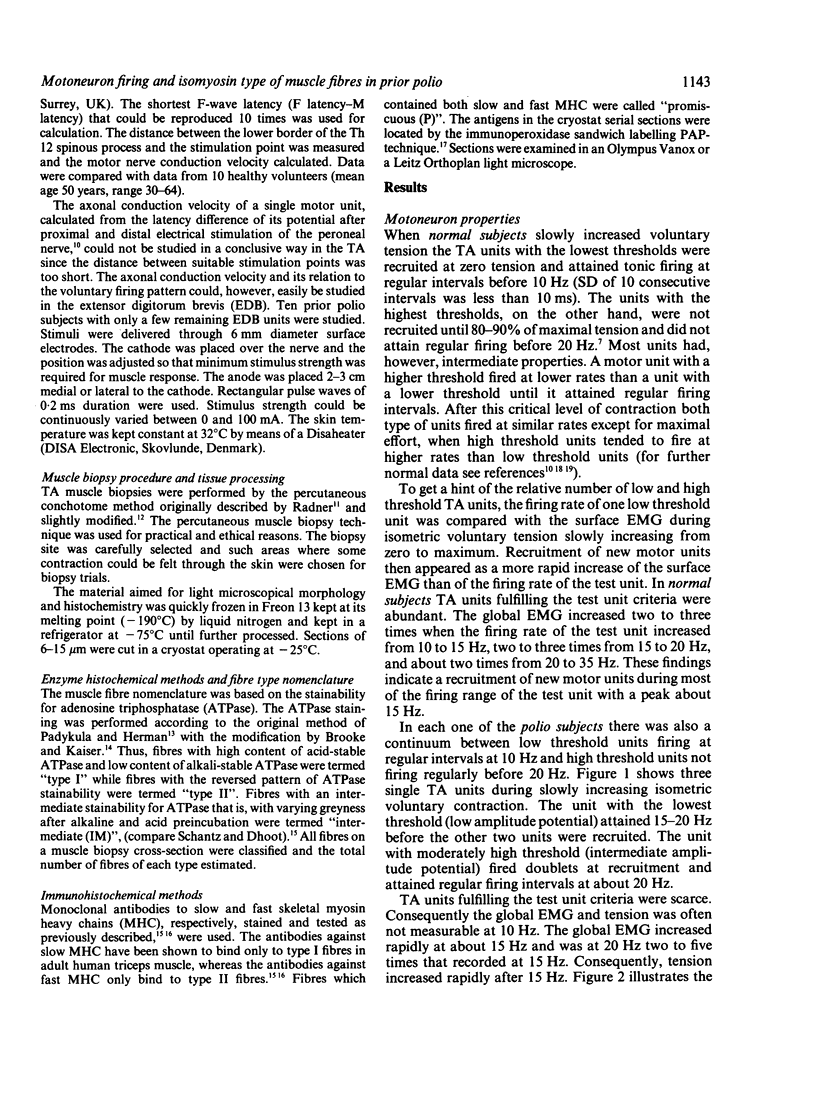
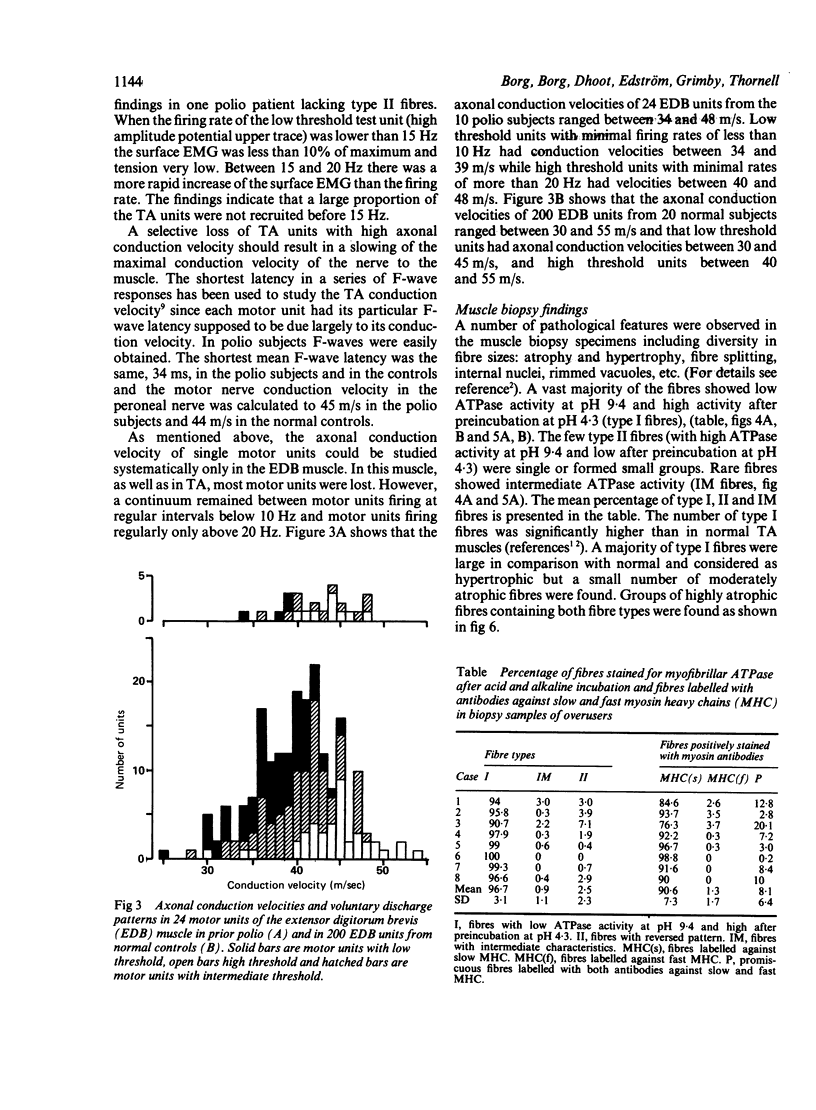
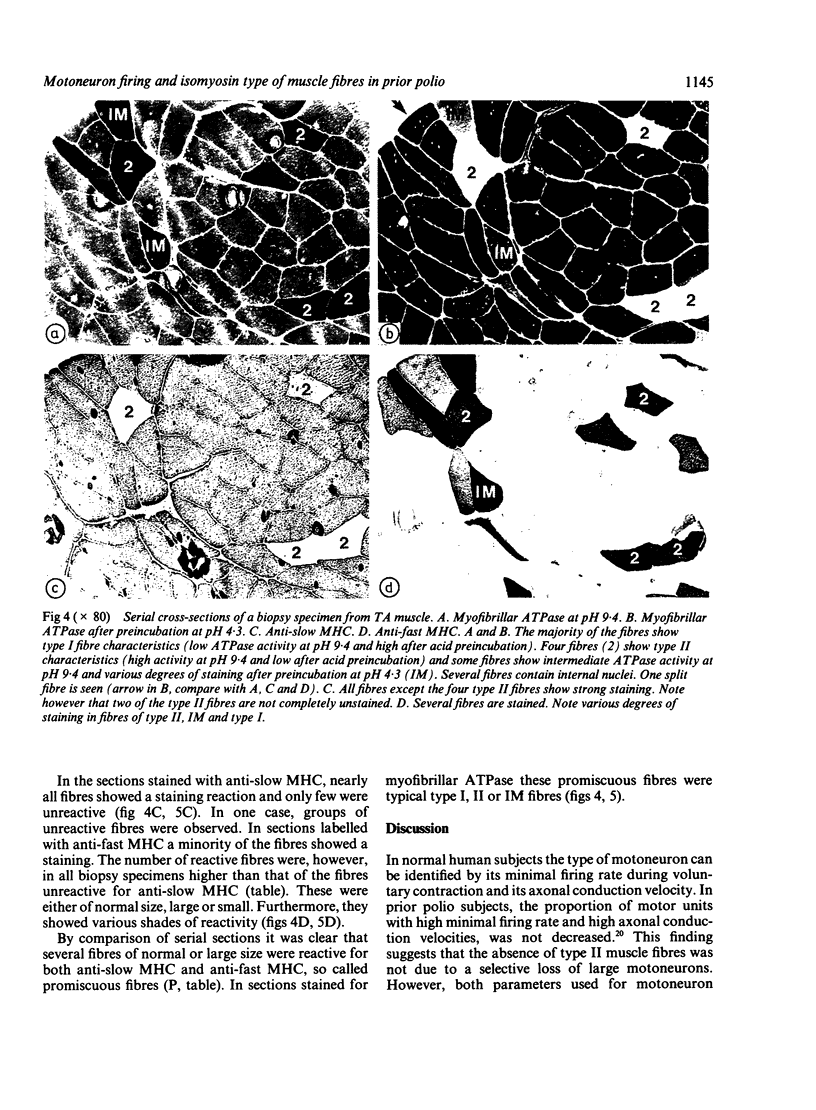
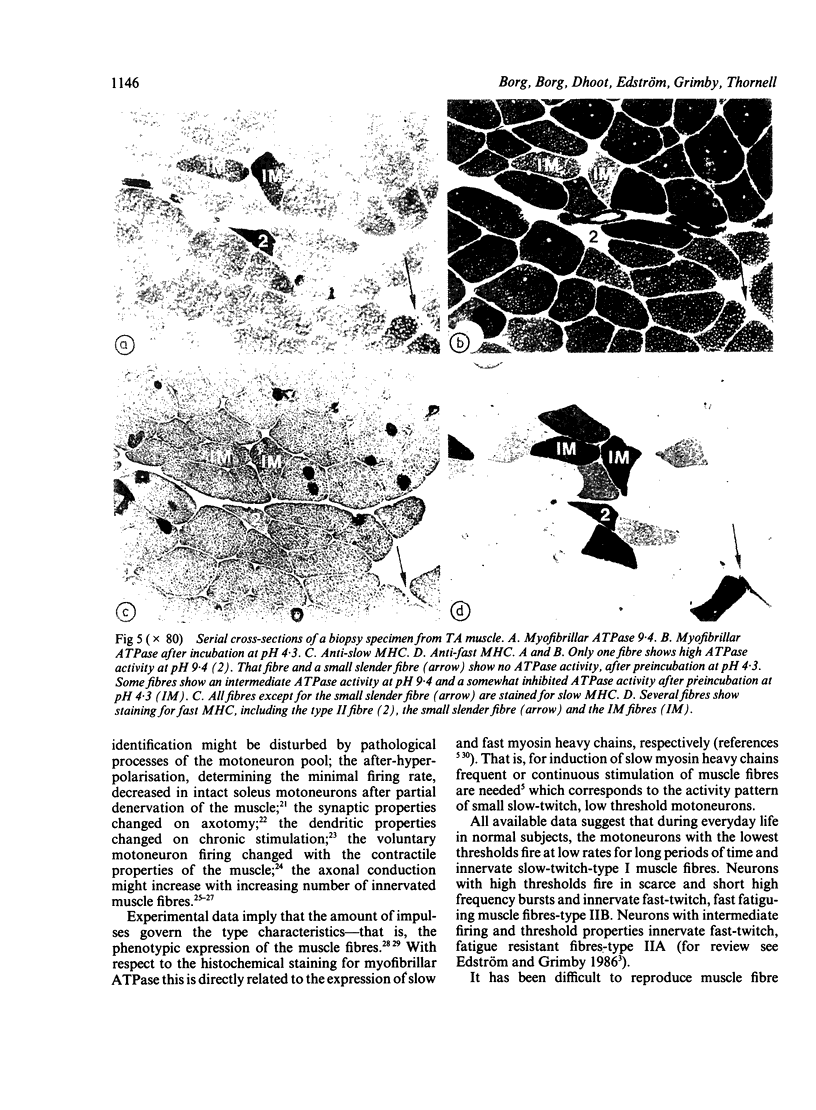
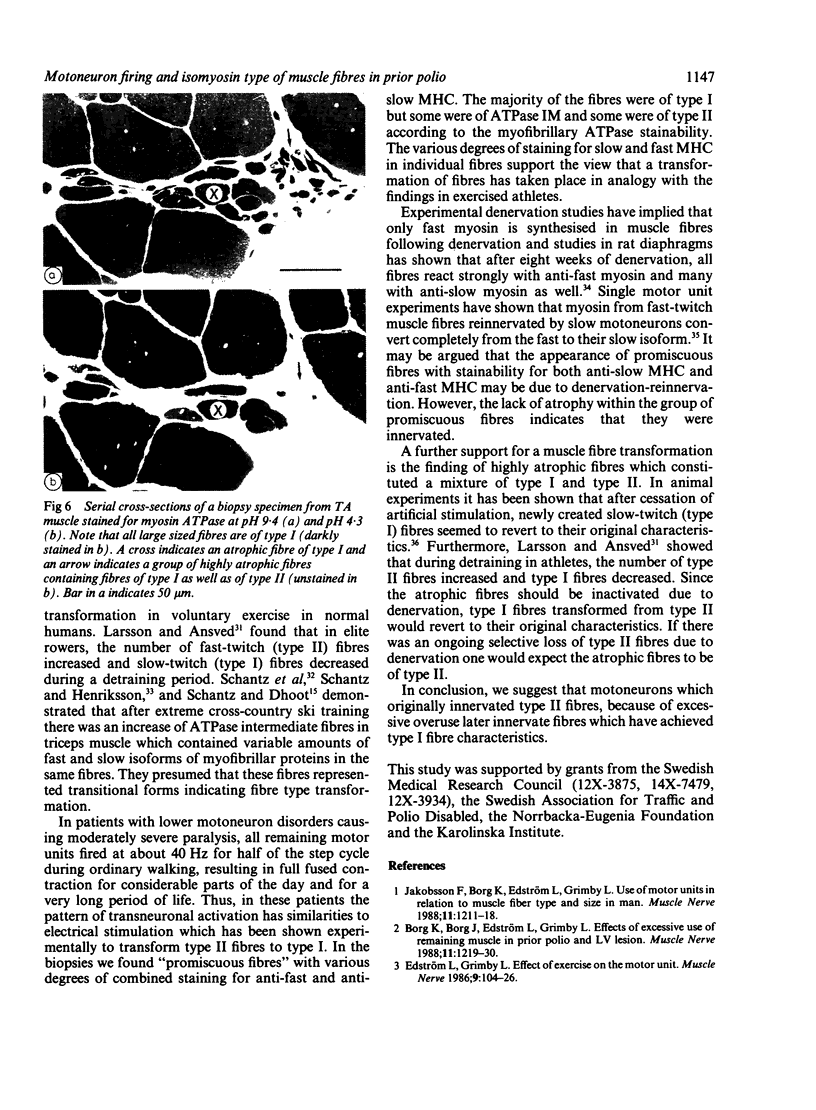
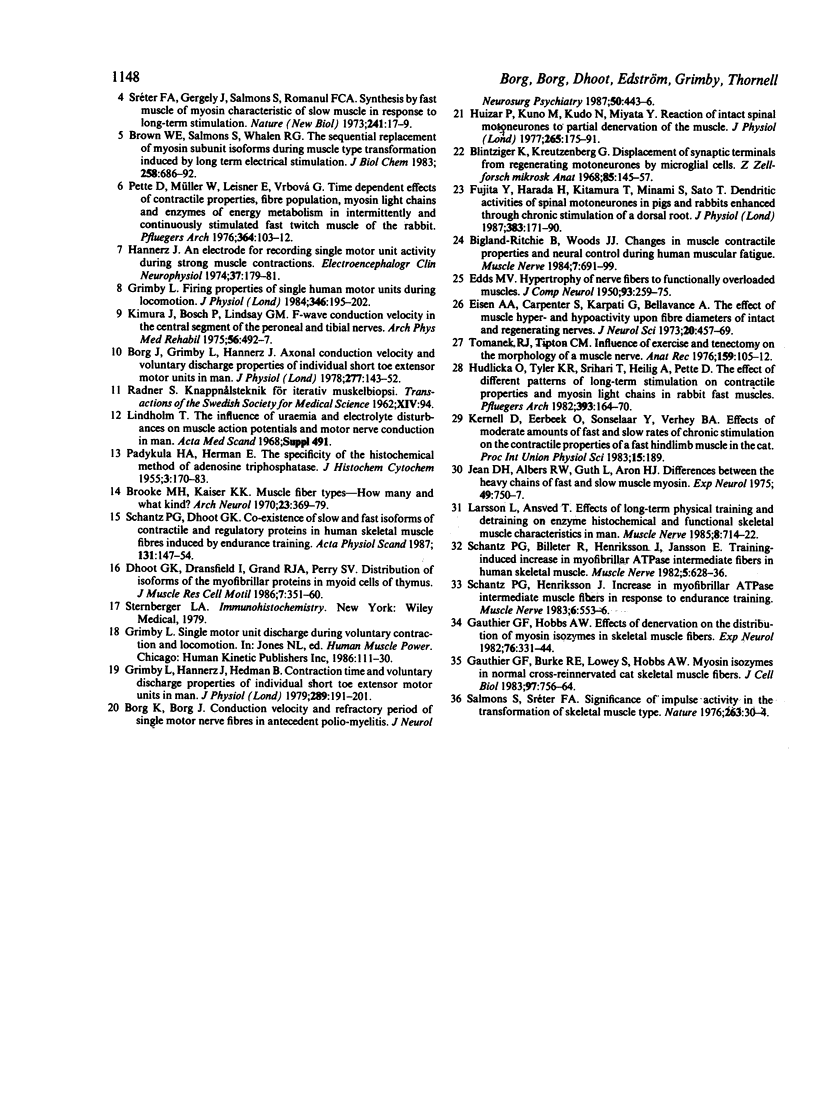
Images in this article
Selected References
These references are in PubMed. This may not be the complete list of references from this article.
- Bigland-Ritchie B., Woods J. J. Changes in muscle contractile properties and neural control during human muscular fatigue. Muscle Nerve. 1984 Nov-Dec;7(9):691–699. doi: 10.1002/mus.880070902. [DOI] [PubMed] [Google Scholar]
- Borg J., Grimby L., Hannerz J. Axonal conduction velocity and voluntary discharge properties of individual short toe extensor motor units in man. J Physiol. 1978 Apr;277:143–152. doi: 10.1113/jphysiol.1978.sp012266. [DOI] [PMC free article] [PubMed] [Google Scholar]
- Borg K., Borg J., Edström L., Grimby L. Effects of excessive use of remaining muscle fibers in prior polio and LV lesion. Muscle Nerve. 1988 Dec;11(12):1219–1230. doi: 10.1002/mus.880111206. [DOI] [PubMed] [Google Scholar]
- Brooke M. H., Kaiser K. K. Muscle fiber types: how many and what kind? Arch Neurol. 1970 Oct;23(4):369–379. doi: 10.1001/archneur.1970.00480280083010. [DOI] [PubMed] [Google Scholar]
- Dhoot G. K., Dransfield I., Grand R. J., Perry S. V. Distribution of isoforms of the myofibrillar proteins in myoid cells of thymus. J Muscle Res Cell Motil. 1986 Aug;7(4):351–360. doi: 10.1007/BF01753656. [DOI] [PubMed] [Google Scholar]
- EDDS M. V., Jr Hypertrophy of nerve fibers to functionally overloaded muscles. J Comp Neurol. 1950 Oct;93(2):259–275. doi: 10.1002/cne.900930207. [DOI] [PubMed] [Google Scholar]
- Edström L., Grimby L. Effect of exercise on the motor unit. Muscle Nerve. 1986 Feb;9(2):104–126. doi: 10.1002/mus.880090203. [DOI] [PubMed] [Google Scholar]
- Eisen A. A., Carpenter S., Karpati G., Bellavance A. The effect of muscle hyper- and hypoactivity upon fibre diameters of intact and regenerating nerves. J Neurol Sci. 1973 Dec;20(4):457–469. doi: 10.1016/0022-510x(73)90176-7. [DOI] [PubMed] [Google Scholar]
- Filep J., Földes-Filep E. Effect of urinary pH and urine flow rate on prostaglandin E2 and kallikrein excretion by the conscious dog. J Physiol. 1987 Feb;383:1–8. doi: 10.1113/jphysiol.1987.sp016391. [DOI] [PMC free article] [PubMed] [Google Scholar]
- Gauthier G. F., Burke R. E., Lowey S., Hobbs A. W. Myosin isozymes in normal and cross-reinnervated cat skeletal muscle fibers. J Cell Biol. 1983 Sep;97(3):756–771. doi: 10.1083/jcb.97.3.756. [DOI] [PMC free article] [PubMed] [Google Scholar]
- Gauthier G. F., Hobbs A. W. Effects of denervation on the distribution of myosin isozymes in skeletal muscle fibers. Exp Neurol. 1982 May;76(2):331–346. doi: 10.1016/0014-4886(82)90213-8. [DOI] [PubMed] [Google Scholar]
- Grimby L. Firing properties of single human motor units during locomotion. J Physiol. 1984 Jan;346:195–202. doi: 10.1113/jphysiol.1984.sp015016. [DOI] [PMC free article] [PubMed] [Google Scholar]
- Grimby L., Hannerz J., Hedman B. Contraction time and voluntary discharge properties of individual short toe extensor motor units in man. J Physiol. 1979 Apr;289:191–201. doi: 10.1113/jphysiol.1979.sp012732. [DOI] [PMC free article] [PubMed] [Google Scholar]
- Hannerz J. An electrode for recording single motor unit activity during strong muscle contractions. Electroencephalogr Clin Neurophysiol. 1974 Aug;37(2):179–181. doi: 10.1016/0013-4694(74)90011-x. [DOI] [PubMed] [Google Scholar]
- Hudlická O., Tyler K. R., Srihari T., Heilig A., Pette D. The effect of different patterns of long-term stimulation on contractile properties and myosin light chains in rabbit fast muscles. Pflugers Arch. 1982 Apr;393(2):164–170. doi: 10.1007/BF00582940. [DOI] [PubMed] [Google Scholar]
- Huizar P., Kuno M., Kudo N., Miyata Y. Reaction of intact spinal motoneurones to partial denervation of the muscle. J Physiol. 1977 Feb;265(1):175–191. doi: 10.1113/jphysiol.1977.sp011711. [DOI] [PMC free article] [PubMed] [Google Scholar]
- Jean D. H., Albers R. W., Guth L., Aron H. J. Differences between the heavy chains of fast and slow muscle myosin. Exp Neurol. 1975 Dec;49(3):750–757. doi: 10.1016/0014-4886(75)90056-4. [DOI] [PubMed] [Google Scholar]
- Kimura J., Bosch P., Lindsay G. M. F-wave conduction velocity in the central segment of the peroneal and tibial nerves. Arch Phys Med Rehabil. 1975 Nov;56(11):492–497. [PubMed] [Google Scholar]
- Larsson L., Ansved T. Effects of long-term physical training and detraining on enzyme histochemical and functional skeletal muscle characteristic in man. Muscle Nerve. 1985 Oct;8(8):714–722. doi: 10.1002/mus.880080815. [DOI] [PubMed] [Google Scholar]
- PADYKULA H. A., HERMAN E. The specificity of the histochemical method for adenosine triphosphatase. J Histochem Cytochem. 1955 May;3(3):170–195. doi: 10.1177/3.3.170. [DOI] [PubMed] [Google Scholar]
- Pette D., Müller W., Leisner E., Vrbová G. Time dependent effects on contractile properties, fibre population, myosin light chains and enzymes of energy metabolism in intermittently and continuously stimulated fast twitch muscles of the rabbit. Pflugers Arch. 1976 Jul 30;364(2):103–112. doi: 10.1007/BF00585177. [DOI] [PubMed] [Google Scholar]
- Schantz P. G., Dhoot G. K. Coexistence of slow and fast isoforms of contractile and regulatory proteins in human skeletal muscle fibres induced by endurance training. Acta Physiol Scand. 1987 Sep;131(1):147–154. doi: 10.1111/j.1748-1716.1987.tb08216.x. [DOI] [PubMed] [Google Scholar]
- Schantz P., Billeter R., Henriksson J., Jansson E. Training-induced increase in myofibrillar ATPase intermediate fibers in human skeletal muscle. Muscle Nerve. 1982 Oct;5(8):628–636. doi: 10.1002/mus.880050807. [DOI] [PubMed] [Google Scholar]
- Schantz P., Henriksson J. Increases in myofibrillar ATPase intermediate human skeletal muscle fibers in response to endurance training. Muscle Nerve. 1983 Oct;6(8):553–556. doi: 10.1002/mus.880060803. [DOI] [PubMed] [Google Scholar]
- Tomanek R. J., Tipton C. M. Influence of exercise and tenectomy on the morphology of a muscle nerve. Anat Rec. 1967 Sep;159(1):105–113. doi: 10.1002/ar.1091590114. [DOI] [PubMed] [Google Scholar]





